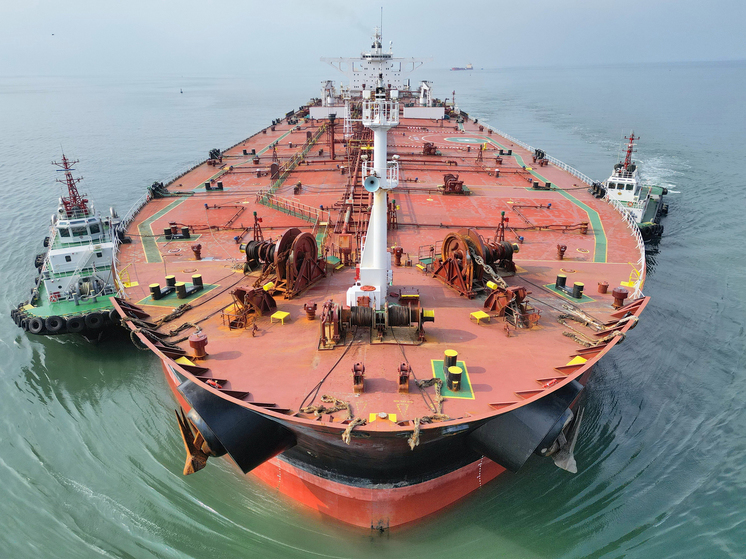“A sharp rise in prices will hit both Europe and the United States”
Brussels may impose sanctions on “shadow fleet” tankers that maliciously do not comply with the $60 price ceiling rule per barrel of Russian Urals oil. According to Reuters, the European Commission proposes to include this measure in its 14th sanctions package. However, Russian experts believe that this idea, drawn with a pitchfork on the water, will not receive practical continuation — for several significant reasons.

“Russia continues to try to violate the price ceiling for the export of its oil,” noted Deputy Head of the European Commission Valdis Dombrovskis. European officials have said something similar before. And they even acted: the 11th package of EU sanctions adopted in June 2023 included a ban on entry into European ports for tankers trying to circumvent the price limit.
However, as it turned out, this clerical measure had virtually no effect on real life: in 2023, Russian oil exports amounted to 234.3 million tons, which is only 3.3% lower than the previous year. The result was achieved against the backdrop of two formidable sanctions from the G7 countries, which came into force on December 5, 2022: a price ceiling of $60 and an embargo on maritime supplies of raw materials from the Russian Federation. We should not forget about the factor of Moscow’s voluntary reduction in oil production from March 2023 to the end of 2024 by half a million barrels per day.
The fight against the “shadow fleet” declared by the collective West is not becoming systemic and is so far being carried out mainly by the efforts of the Americans. According to Bloomberg, from October to December 2023, the US Treasury imposed sanctions on eight individual tankers, before the end of the year, 24 more were added to the list, and in January 2024, 18 more, owned by Hennesea Holdings (based in the UAE). As the agency wrote in February, “vessels are idle in ports or open waters and cannot accept new cargo.”
“It is far from certain that the European Union will be able to bring the entire “shadow fleet” transporting Russian oil under sanctions,” says Igor Yushkov, an expert at the Financial University under the Government of the Russian Federation. – Firstly, this is a real armada of about 500 tankers, which sail under the flanks of a variety of states. The same number of vessels from the “twilight flotilla” work with Iranian and Venezuelan oil. From December 2022 to the present day, only about 50 tankers were included in the American “blacklists”. Europe not only has much less leverage over those subject to sanctions, but also less understanding of what exactly needs to be done. They are clearly less afraid of it than the United States.”
But the main thing is different, notes MK’s interlocutor: Washington is absolutely not interested in reducing the volume of Russian oil exports. That is why the price ceiling was invented: its strategic purpose is to create additional obstacles for Moscow, leading to increased costs and decreased income from the sale of raw materials for the country's political leadership. But under no circumstances should we allow Russia (under the influence of large-scale sanctions against the “shadow fleet”) to reduce export volumes and stop supplying world markets with oil. This scenario is fraught with a sharp rise in energy prices, which will hit both America and Europe.
“We see what titanic efforts the United States is making to eliminate the slightest potential reasons for the rise in oil prices on the global market,” says Yushkov. “In particular, they did everything possible to de-escalate the Iran-Israeli conflict. And now they may well “hint” to the Europeans to leave the “shadow fleet” alone and not cross this very dangerous line. Accordingly, Russia will not suffer any damage. However, Moscow itself should take care of developing its own shipbuilding, transportation insurance system, and all infrastructure of this kind. Strategically, this will protect us from risks similar to the current ones.”
Of course, new sanctions against specific companies and vessels may affect the discount on Urals oil, but that will all end, says financial analyst and private investor Fedor Sidorov. According to him, the main difficulty in the fight against the “shadow fleet” is that in the West they are not able to reliably determine the interest of each individual shipment. Confusion manifests itself in different forms: either the authors of the sanctions seek to return the transportation of Russian raw materials to European transport companies, or they point to environmental risks from the use of outdated ships, or something else.
“At the same time, it is absolutely obvious that The same “outdated ships” transport not only Russian oil illegally, but also legally many other cargoes for other countries,” Sidorov sums up. “The G7 countries do not have a real mechanism for influencing shipowners, and therefore they resort to intimidating rhetoric.”


